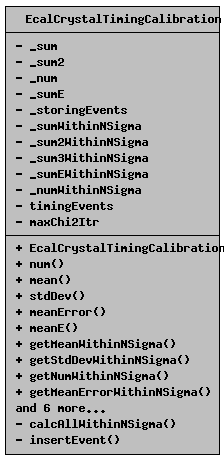|
EcalTiming
|
#include <EcalTiming/EcalTiming/interface/EcalCrystalTimingCalibration.h>

Public Member Functions | |
| EcalCrystalTimingCalibration (bool weightMean=true) | |
| default constructor | |
| float | stdDev () const |
| average time (mean of the time distribution) More... | |
| float | getMeanWithinNSigma (float sigma, float maxRange) const |
| average Energy (mean of the Energy distribution) More... | |
| float | getStdDevWithinNSigma (float sigma, float maxRange) const |
| returns the stdDev calculated within abs(mean+ n * stdDev) to reject tails | |
| float | getNumWithinNSigma (float sigma, float maxRange) const |
| returns the num calculated within abs(mean+ n * stdDev) to reject tails | |
| float | getMeanErrorWithinNSigma (float sigma, float maxRange) const |
| returns the error on the mean calculated within abs(mean+ n * stdDev) to reject tails | |
| float | getSkewnessWithinNSigma (float sigma, float maxRange) const |
| returns the skewness calculated within abs(mean+ n * stdDev) to reject tails | |
| bool | add (EcalTimingEvent te_, bool storeEvent=true) |
| add new event for this crystal | |
| void | dumpToTree (TTree *tree, int ix_, int iy_, int iz_, unsigned int status_, unsigned int elecID_, int iRing_) |
| dump the full set of events in a TTree: need an empty tree | |
| void | dumpCalibToTree (TTree *tree, int rawid_, int ix_, int iy_, int iz_, unsigned int elecID_, int iRing_) const |
| bool | isStableInEnergy (float min, float max, float step, std::vector< std::pair< float, EcalCrystalTimingCalibration * > > &ret) |
| checks if the time measurement is stable changing the min energy threshold | |
Private Member Functions | |
| void | calcAllWithinNSigma (float n_sigma, float maxRange=10) const |
| calculate sum, sum2, sum3, n for time if time within n x stdDev and store the result | |
| bool | insertEvent (EcalTimingEvent te_, bool storeEvent) |
Private Attributes | |
| float | _sum |
| scalar sum of the time of each timingEvent | |
| float | _sum2 |
| scalar sum of the square of the time of each timingEvent | |
| unsigned long int | _num |
| number of timingEvents; | |
| float | _sumE |
| scalar sum of the energy of each timingEvent: needed for average energy | |
| std::map< float, float > | _sumEWithinNSigma |
| variables for calculation of mean, stdDev within n-times the origina stdDev (to remove tails) | |
| std::map< float, unsigned int > | _numWithinNSigma |
| variables for calculation of mean, stdDev within n-times the origina stdDev (to remove tails) | |
| std::vector< EcalTimingEvent > | timingEvents |
| vector containing all the events for this crystal | |
Description: add a description here This class contains all the timing information for a single crystal
| void EcalCrystalTimingCalibration::dumpCalibToTree | ( | TTree * | tree, |
| int | rawid_, | ||
| int | ix_, | ||
| int | iy_, | ||
| int | iz_, | ||
| unsigned int | elecID_, | ||
| int | iRing_ | ||
| ) | const |
dump the callibratoin to the tree
References getMeanErrorWithinNSigma(), getMeanWithinNSigma(), and getNumWithinNSigma().

| float EcalCrystalTimingCalibration::getMeanWithinNSigma | ( | float | sigma, |
| float | maxRange | ||
| ) | const |
returns the mean time within abs(mean+ n * stdDev) to reject tails
References _numWithinNSigma, and calcAllWithinNSigma().
Referenced by dumpCalibToTree(), getSkewnessWithinNSigma(), and getStdDevWithinNSigma().


|
inlineprivate |
References _num, _sum, _sum2, _sumE, EcalTimingEvent::energy(), EcalTimingEvent::time(), and timingEvents.
Referenced by add().


|
inline |
< standard deviation of the time distribution
Referenced by calcAllWithinNSigma(), and getSkewnessWithinNSigma().

 1.8.5
1.8.5